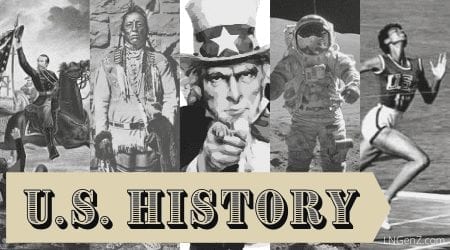-
American Pre-History
-
US History
- Why History Matters – Lesson – VIDEO
- The Importance of History: The Past Is the Key to the Future – Lesson
- Presentism and Its Evil – Lesson
- Historical Statues: Should they Stay or Go – Lesson
- Civil Unrest in the United States: A History – Lesson
- Presidents and the Cost of War – Lesson
- Presidents and the Cost of War – Quiz
-
Arrival of Europeans
-
Westward Expansion
-
Civil War and Reconstruction
- The Roots and the Rise of the Civil War – Lesson
- The Roots and the Rise of the Civil War – Quiz
- Civil War: The War Between the States – Lesson
- Civil War: The War Between the States – Quiz
- Reconstruction: Trying to Rebuild a Broken Nation – Lesson
- Reconstruction: Trying to Rebuild a Broken Nation – Quiz
-
Immigration and America
-
20th Century and Modern America
- Black Lives Matter and the Anarchists of 1919 – Lesson
- Prohibition: The Failed Attempt to Outlaw Drunkenness – Lesson
- Attack on Pearl Harbor: Bringing America into World War II – Lesson
- Survivors Tell Their Stories on 80th Anniversary of Pearl Harbor Attack – Lesson
- Survivors Tell Their Stories on 80th Anniversary of Pearl Harbor Attack – Quiz
- Marion Robert Goff: A Soldier’s Tale on D-Day – Lesson
- Marion Robert Goff: A Soldier’s Tale on D-Day – Quiz
- France Says ‘Merci Les Américains’ on Bastille Day – Lesson
- France Says ‘Merci Les Américains’ on Bastille Day – Quiz
- A Closer Look at Martin Luther King’s ‘I Have a Dream’ Speech – Lesson
- A Closer Look at Martin Luther King’s ‘I Have a Dream’ Speech – Quiz
- 50 Years Since Nixon Went to China: Ping-Pong Diplomacy – Lesson (Part 1)
- 50 Years Since Nixon Went to China: Ping-Pong Diplomacy – Quiz
- 50 Years Since Nixon Went to China: ‘The Week That Changed the World’ – Lesson (Part 2)
- 50 Years Since Nixon Went to China: ‘The Week That Changed the World’ – Quiz
-
The 21st Century: A New Millennium
Louisiana Purchase: How the West Was Won – Lesson
The Louisiana Purchase doubled the size of the United States and drove the westward push to the Pacific.
By the time Thomas Jefferson became the third U.S. president in 1801, the United States stretched from the Atlantic Ocean to the Mississippi River. Jefferson knew that gaining access to the river and the Gulf of Mexico would greatly strengthen the young nation. However, that land was controlled by France, and French leader Napoleon Bonaparte wasn’t interested in making a land deal with the United States. Jefferson wouldn’t give up, so he sent in James Monroe to try again, and the Louisiana Purchase was born. Monroe secured the largest land deal in the nation’s history and almost doubled the size of the country: the entire Louisiana Territory – 827,000 square miles – for $15 million.
 Napoleon’s Plan, Thwarted
Napoleon’s Plan, Thwarted
Napoleon wanted a French Empire across North America. He planned to send 25,000 soldiers and 63 ships to New Orleans, to occupy the city. But it wasn’t meant to be. A slave revolt in the Caribbean and an outbreak of yellow fever defeated his plan. In the end, Napoleon lost over 60,000 troops and had no hope of establishing a strong presence in Louisiana. By the time Jefferson sent Monroe to negotiate a land deal for New Orleans, Napoleon just wanted out of the colony and needed money for a war with England.
Westward Expansion and the Anti-Federalist Dilemma
President Jefferson had several reasons for wanting to make the land deal, but the main reason was national security. He had hoped only for the port of New Orleans. When Monroe returned with the news that Napoleon wanted to sell all of Louisiana for $15 million, Jefferson was faced with a dilemma.
The benefits of the Louisiana Purchase were obvious, but Jefferson was strongly anti-federalist and didn’t believe that the government should have any more power than exactly what the Constitution said – and the Constitution didn’t say he could make that purchase. Jefferson worried that if he waited for a change to the Constitution, the deal would fall through and there would be no way to avoid war with France. So he compromised. With the support of the American people, Jefferson agreed to the purchase.
Manifest Destiny, From Sea to Shining Sea
The Louisiana Purchase, which was made in 1803, went down in history as the greatest accomplishment in Jefferson’s presidency. It nearly doubled the size of the United States and led to the idea that the nation had a “Manifest Destiny” to reach from the Atlantic to the Pacific. The Louisiana Purchase changed the way other nations dealt with the United States and played major roles in both the War of 1812 and the Civil War. Indeed, without the land that eventually became 15 new states, the Civil War might never have happened.